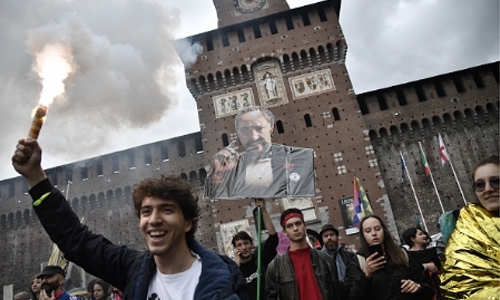Is Italy’s front-runner a Marshmallow?
On May 13, at a rally near Bergamo, the heartland of right-wing party the League, which is ahead in polls approaching this week’s European elections, its leader Matteo Salvini asked the police to remove a banner hanging from a window. It read: “You are not welcome.” Not a smart move on his part. Suddenly, anti-Salvini banners started popping up wherever he went. Some were quite funny.
One man in Florence posted a banner from his tiny attic with a challenge to the authorities to take it down: “Bring a long ladder. I live on the fifth floor,” he wrote. On May 18, at the rally with several leaders of the European far right, including Marine Le Pen of France and Viktor Orban of Hungary, Salvini could watch another joyful display. Banners mocking him were everywhere. A man dressed as Zorro — including an eye-mask and a sword — appeared on a balcony in the Piazza del Duomo, where the crowd gathered to listen to the speeches. We Italians are an irreverent bunch, and hard to rein in.
Our deep-rooted distrust of power, in regular times, may be a drawback; but in exceptional moments like this one, it’s a form of insurance. Lately, Salvini has become more prone than ever to acting over the top. Speaking from a balcony that was used by Benito Mussolini, downplaying fascism at every turn, flirting with supremacist groups and praising Vladimir Putin’s Russia are hardly appropriate, in a democracy, for a party leader who is also interior minister and deputy prime minister. But jumping to conclusions is also wrong.
There is no chance that Italy will become an authoritarian state, let alone a second fascist regime. We are too undisciplined for that. And Salvini may be a cheeky demagogue, but he’s no dictator. It’s undeniable, though, that he must be monitored. His party won 17 percent in the general election in March, 2018, then formed a government with the Five Star Movement — which got nearly 33 percent — and used it as a springboard. He left the thorny issues — employment, transportation, public works — to his inexperienced partners, and focused on self-promotion.
This involved a lot of barking about the dangers of immigration, spreading fear but accomplishing little. Half a million illegal immigrants, whom he promised to expel pronto, are still here. Fewer come now, it’s true. But the idea of locking down Italian ports and letting people drown at sea doesn’t play well with many Italians — or in the courts. On May 19 a public prosecutor ordered 47 migrants, stranded off the coast on Lampedusa, a tiny island south of Sicily, to be brought ashore, and he confiscated the rescuing boat. Salvini has campaigned endlessly; this year he has held more than 200 rallies and spent a mere 17 full days in his ministerial office, according to one newspaper’s tally.
He broadcasts daily on Facebook, tweets with Trump-like ferocity, and posts selfies wearing every type of uniform. Earlier this month, he introduced “Vinci Salvini” (Win Salvini), a campaign in which voters gain points by posting likes on Facebook, Instagram and Twitter. And what do they win? Their photos on their leader’s social profiles and, he beams, “for the lucky ones, even a chat on the phone with me!” This frantic activity has helped Matteo — as he is known among the faithful — gain a consensus on the right, even in the poorer South, where the League was despised until recently.
Meanwhile, Silvio Berlusconi, whom Italians used to call “Cavaliere,” is, despite declining health, leading his much weakened Forza Italia party into the election, using the slogans and images from its historic win in 1994. But the aging Berlusconi is no match for the younger, tech-savvy Salvini. According to the latest polls available — Italian law forbids publishing them in the two weeks before elections — Forza Italia is at well under 10 percent, with the League between 30 and 35 percent. Some predict that on May 26 the League could end up being one of Europe’s largest parties.
But there are small signs that may point to a different outcome. To start with, Five Star is fighting back, attacking its allies (about corruption, regional autonomy, and expanding Italy’s flat tax) and hinting at a possible leftist alliance with the Democratic Party. More important, the current government hasn’t delivered. Italy’s economic growth is the slowest in the European Union, public debt keeps piling up and international investors are nervous. The patience of business people and entrepreneurs, especially in the wealthy north, is wearing thin.
And they represent the core of the League’s support. The European elections are so close now that Salvini is bound to do well. But the mood is changing. It’s like with marshmallows: the sweets you can’t get enough of, until you are suddenly sick of them. And Matteo’s marshmallow moment may be coming sooner than most expect. Italy’s political mood has known big swings in the recent past. Berlusconi was unceremoniously sacked in 2011; Mario Monti was extremely popular in 2012, helped get Italy’s public finances in order, and then became — undeservedly — a figure of hate; in 2014, Matteo Renzi, then leader of the Democratic Party, polled a stunning 41 percent in the European election, and was dumped in 2016.
His fault? An untimely referendum on constitutional reform and a self-assurance that bordered on arrogance. Even Beppe Grillo, the larger-thanlife founder of the Five Star Movement, quickly became a has-been, and was sidelined by his own people. So never underestimate our operatic tendencies. In Italy we cheer our tenors — until we boo them off the stage. And we chew our delicious marshmallows until, suddenly, we’ve had enough and spit them out in spectacular fashion. Matteo Salvini, be warned: the Italian political trash can always has room for one more.
Related Posts

